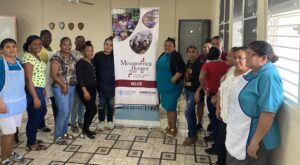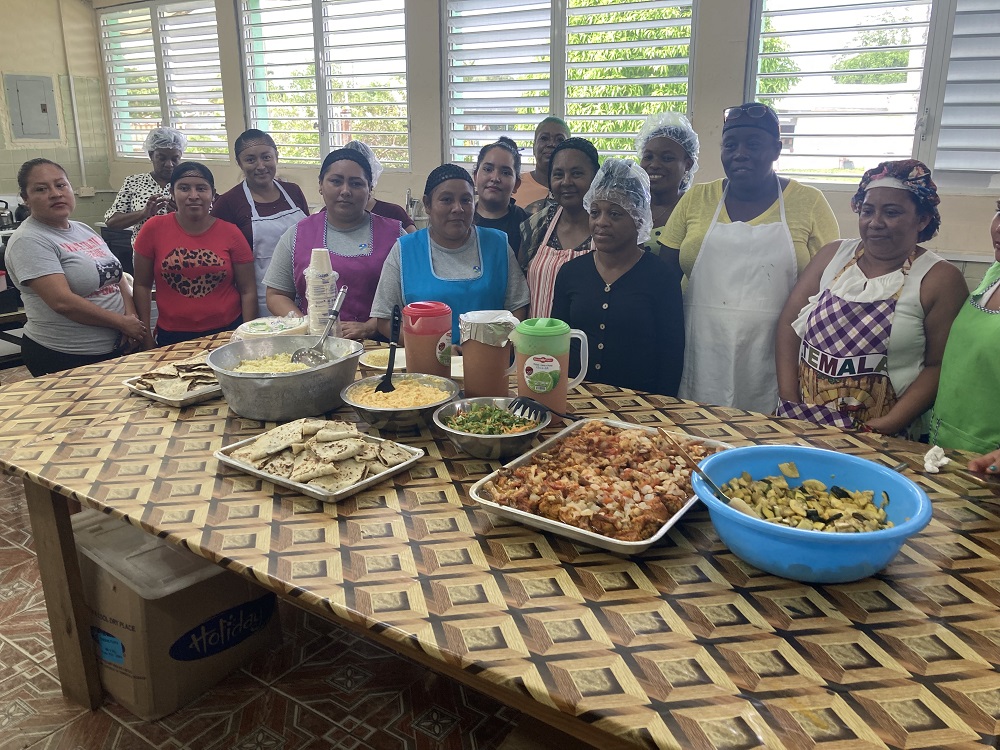#Belize, December 29, 2023 – In an effort to strengthen the capacity of individuals involved in school feeding programs and promote healthy eating habits among school children, the Belizean component of the Mesoamerica Hunger-Free AMEXCID-FAO program conducted a series of training sessions. These included virtual sessions held on November 21st, 28th, and December 6th, and in-person cook training sessions on December 9th and 16th. The sessions brought together a diverse group of participants, including school principals, cooks, PTA members, school staff, and Ministry of Education personnel within the government feeding programs – National Healthy Start school feeding program (primary schools) and the Education Upliftment program (high schools).
staff, and Ministry of Education personnel within the government feeding programs – National Healthy Start school feeding program (primary schools) and the Education Upliftment program (high schools).
The three virtual training sessions were specifically designed to enhance the capabilities and skills of officials responsible for the School Feeding Program. These sessions were crucial in facilitating the expansion of school feeding programs, school gardens, and nutrition education within the education curriculum.
The key objectives included providing an overview of healthy school environments, emphasizing the importance of school feeding to children’s health, reviewing food health and safety protocols in school kitchens, and introducing basic nutrition needs for students.
The inaugural session, conducted by Cathleen Juan, Mesoamerica Hunger-Free AMEXCID-FAO and School Feeding Coordinator, covered topics such as the introduction of the term “Healthy School Environment,” components of such an environment, an overview of diet-related non-communicable diseases, statistics on overweight/obesity, and the consumption of sugar-sweetened beverages among school children in Belize. Additionally, discussions on ultra processed foods, reading food labels, and healthy alternatives for school snacks were presented.
Led by Ms. Lisa Marin Sanchez, Senior Public Health Inspector from the Ministry of Health, the second session covered topics such as food handler’s responsibilities, types of contamination and prevention measures, personal hygiene and handwashing, purchasing safe food, proper food storage, and safe food preparation and cooking practices, with a focus on time and temperature controls. One of the most insightful takeaways from Ms. Lisa’s session was her revelation about the most common food safety infraction observed in kitchens: the lack of temperature controls.
The third and final virtual session, held on December 6th, featured Doris Sutherland, nutritionist from FAO Belize, who offered a deep dive into essential topics, such as an overview of food groups and appropriate portion sizes, the nutritional significance of fruits, vegetables, proteins, and staples in a child’s diet, and an introduction to the school feeding menu. The session also provided valuable insights into menu planning, recipe formats, ingredient substitution, and methods to encourage children to embrace fruits and vegetables.
The Program’s emphasis on inclusivity, evidenced by the virtual format accommodating even those from areas with limited resources, underscores its dedication to making a meaningful impact on school feeding programs across Belize.
Following the virtual sessions, in-person training was conducted for school feeding head cooks, focusing on nutrition, food safety, school menus, and utilizing local produce. These sessions took place at Ladyville Technical High School, Belize District with participation from 16 schools across four districts.
nutrition, food safety, school menus, and utilizing local produce. These sessions took place at Ladyville Technical High School, Belize District with participation from 16 schools across four districts.
During these in-person sessions, cooks practiced calculating ingredients for 100 children and learned about the ice water calibration method for thermometers. They were divided into groups to prepare various dishes, highlighting the use of vegetables and the absence of added sugar in flavorful recipes. Each school represented was given two thermometers for their kitchen.
These training sessions have successfully equipped participants with a deeper understanding of the significance of healthy food choices and food safety practices in the context of school feeding, reinforcing the valuable lessons learned and ensuring a brighter, healthier future for Belizean schoolchildren.
The Mesoamerica Hunger-Free AMEXCID-FAO program remains committed to fostering a comprehensive understanding of aspects to promote healthier school environments and, consequently, the well-being of the children involved, promoting public policies in favor of food and nutritional security in the country.
Caption: The objectives of the cook training sessions were to familiarize cooks with the recipe structure used in the menus (standardized for 50 servings), teach cooks to use the menu planning tool in the school kitchen protocol book, instruct on the use of thermometers during food preparation, and introduce new ways of preparing local fruits and vegetables.


 News1 week ago
News1 week ago
 Bahamas News5 days ago
Bahamas News5 days ago
 Bahamas News4 days ago
Bahamas News4 days ago
 Caribbean News1 week ago
Caribbean News1 week ago
 News1 week ago
News1 week ago
 Health4 days ago
Health4 days ago
 News1 week ago
News1 week ago












